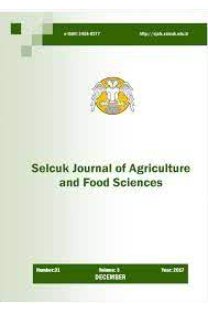The Effects of Nitrogen Protoxide and Orizalin on Promotion of Polyploidy in Grapes
The Effects of Nitrogen Protoxide and Orizalin on Promotion of Polyploidy in Grapes
The effort to reach higher yield and quality in grape production without losing the current quality has led researchers to induce polyploidy with chemical mutagens that cause less damage to the environment and researchers to obtain polyploid grape genotypes. The fact that the number of polyploid grape varieties and their production continue to increase creates synergy for research in this direction. In this study, Nitrous Protoxide, Oryzalin and their combined applications were tested to induce polyploidy in seeds and seedlings whose germination was exponentially induced of cvs. Ekşi Kara and Gök Üzüm (both Vitis vinifera L.). After 48-h, N2O at 5 bar pressure was applied to seeds that germinated until root tips were visible, as well as 48-h and/or 96-h 0 (control), 25 μM and 100 μM oryzalin were applied to seedlings whose cotyledon leaves reached full size. Ploidy verification was made by flow cytometry (FC) analysis in selected seedlings by examining the effects of the treatments on the surviving seedling rate, stoma density and size, and the number of chloroplasts. While the morphological and cytological effects of all mutagen applications were found to be significant, only one seedling selected from 25 μM 48-h oryzalin application in Ekşi Kara cultivar was confirmed by FC analysis. Plant survival rate was lower and morphological differences were more pronounced in the combination of N2O and oryzalin. In future studies, more polyploid induction can be tried with different dose and application time combinations of N2O and oryzalin.
Keywords:
Grapevine, Breeding Poiploidy, Nitrous protoxide, Oryzalin,
- ISSN: 2458-8377
- Yayın Aralığı: Yılda 3 Sayı
- Başlangıç: 2002
Sayıdaki Diğer Makaleler
Morphological and Physiological Effects of Drought Stress on Some Strawberry Cultivars
Mostafa Fraidoon FAAEK, Lütfi PIRLAK
Oscar AKOUEGNONHOU, Nevin DEMİRBAŞ
An Economic Analysis of Plums Production: The Case of Gradacac, Bosnia And Herzegovina
Sumedina SPAHIC-VUKOJEVIC, Mithat DIREK
The Effects of Nitrogen Protoxide and Orizalin on Promotion of Polyploidy in Grapes
Zeki KARA, Mine ERBOĞA, Osman DOĞAN
Effects of Different Frequencies and Potassium Doses on Yield and Yield Components in Seed Sunflower
Rabiya KOYUNCU, Mehmet Ali AVCI
Determination of Combining Ability in Sunflower Parents According to Line X Tester Analysis Method
An Application of Fuzzy Pearson Correlation Methods in Animal Sciences
